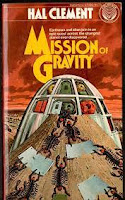I am among the group of people who believe that what is commonly referred to as the Silver Age of science fiction is in fact the Golden Age. What was being published in the 20s-40s is better described as the Pulp era. But I get it. The color nicely complements the image of a sleek, finned space ship pointed skyward, bringing mankind to the frontiers of the unknown, there to continue doing what mankind does best: explore, discover, conquer, and be clever—the optimists' view. Encapsulating that image wonderfully is Hal Clement's innocent Mission of Gravity (1954).
One of the original hard sf texts, Mission of Gravity is set on an oddly shaped planet where gravity is 3x Earth-standard at the equator and 700x at the poles. Populated by a centipede-esque alien race (better to maintain grip on the surface, natch), the novel opens with a human scientist, named Lackland, in need of help from them. A science probe lost deep in the ultra-gravity zone, Lackland embarks on a journey with one of the centipedes, named Barlennan, to retrieve it. Adventure, as they say, ensues.











